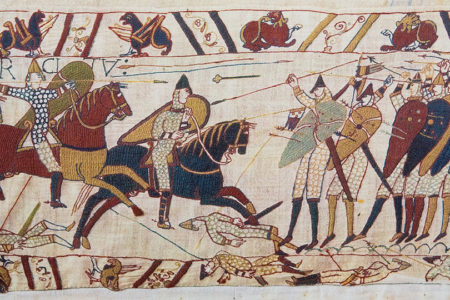Combating Anti-Semitism in the Church
There is nothing new in the current outburst of global anti-Semitism. It has been around for many centuries. In fact, it had its beginnings with Satan after God called the Jews to be a people unto Himself Nation after nation has come against Israel over the ages as part of this satanic thrust, along with multitudes of attacks against Jewish groups and individuals. God, who is in absolute control of all things, has allowed some of these attacks to judge His people at times when they turned away from trusting Him.
Serious satanic attacks against the Jewish people, which began when Israel was in bondage in Egypt, multiplied until, just after the birth of Christ, all the male children under two years of age in the area of Bethlehem were slaughtered. These attacks endured through the centuries, reaching a fever pitch during the Holocaust of Hitler’s Nazi Germany (1933–1945). And they will continue unabated until they reach their zenith in the future Tribulation period, when the pent-up wrath of Satan will be profusely vented on the Jews (Rev. 12:1–17). But, as in previous times, God will once again deliver His people, this time through the literal, physical return of the Lord Jesus Christ to the Mount of Olives in Jerusalem. At that time, Satan, the originator of anti-Semitism, will be bound.
Through the ages, the tentacles of this devilish movement have crept around the world, gradually reaching into almost every nook and cranny of civilization, including, unfortunately, the church. The purpose of this article is to outline the causes of anti-Semitism in the church and show some possible solutions for this age-old but rapidly growing problem.
Anti-Semitism in the Church
Of course, anti-Semitism should not be present in the church of the 20th century, nor should it have been present during any other period of history. This is a very idealistic statement, however, for anti-Semitism does exist and is on the rise behind the doors of some churches in America and around the world.
Today we are seeing the Scriptures being fulfilled before our very eyes. God said through the Prophet Ezekiel, “I will take you [the Jews] from among the nations, and gather you out of all countries, and will bring you into your own land. Then will I sprinkle clean water upon you, and ye shall be clean; from all your filthiness, and from all your idols, will I cleanse you” (Ezek. 36:24–25). The Lord promised to bring world Jewry back home—still in unbelief but prepared for the great end-time events when their hearts will be changed. The same theme is portrayed in Ezekiel chapter 37, where Ezekiel was taken in a vision to a valley that was full of dry bones strewn across a large area. After prophesying, the bones came together to form bodies, and later breath or life came into them. The Bible declares, “these bones are the whole house of Israel” (Ezek. 37:11).
Now we are seeing the Jewish people come together in their own land—still in unbelief but back home. The fact that the omnipotent hand of God has moved upon a great segment of world Jewry to return to Israel in our lifetime is significant. During the last two years alone, more than 480,000 Russian Jews have made Aliyah or returned to Israel, making it their homeland; and more than 10,000 Ethiopian Jews were flown to Israel in just a little over 24 hours.
Christians should be aware of these events and rejoice in what the Lord is doing. Such obvious fulfillment of Scripture should wipe away any tendencies toward anti-Semitism in the church. To have an anti-Semitic perspective in light of the events in Israel from 1948 to the present is to fail to understand or accept the miracle that God is accomplishing before our very eyes.
Theological Anti-Semitism: The predisposition toward or away from theological anti-Semitism depends on the system of hermeneutics or manner of interpretation used to explain the Scriptures. There are two basic systems of hermeneutics used by Christians. One system interprets the Scriptures allegorically or nonliterally, and the other system accepts the Scriptures literally.
Often, the allegorical position leads to some of the following conclusions. First, the promises given to Israel in the Old Testament are not literal. Second, those promises are not for Israel but for the church. Such thinking usually leads to an amillennial theology, which holds that the thousand-year reign of Christ is not literal, and there is, therefore, no future for Israel. This concept leads, in turn, to the position that Israel will never be the head of the nations, and all of the prophetic promises of God regarding Israel relate to the church.
Because the position outlined above foresees no future for Israel in its theological base, it can lead to anti-Semitism. Its adherents may develop an attitude that precludes love for Israel as a nation or even for individual Jews. Because they believe that there is no future for Israel and that all the promises of God are for the church, they may even develop a feeling of disdain for the Jewish people.
Liberalism Often Leads to Anti-Semitism: Churches holding a position that can lead to anti-Semitism are often liberal in doctrine and perspective. Having incorporated the higher criticism of Europe from the last century, these churches include those who do not hold to the cardinal doctrines of the Christian faith, such as the inerrancy of the Scriptures; the virgin birth of Christ; blood atonement; Christ’s physical, bodily resurrection; and His Second Coming. Such theological positions may lead to a very strong anti-Semitic attitude.
A good example of theological anti-Semitism is a statement made by the Very Reverend Francis B. Sayre, Jr., Dean of the National Cathedral in Washington, DC, and a bonafide liberal. On Palm Sunday, 1972, in his address to the gathered worshipers, Sayre took the liberty of linking Israel’s policies in East Jerusalem with the “fatal flaw” of mankind that resulted in the crucifixion of Jesus.1 As has occurred for centuries, blame was once again placed on the Jewish people for crucifying Jesus, and that blame was tied to the policies of modern day Israel in East Jerusalem.
In more recent days, the liberal church community has been among the strongest proponents of antagonism against the State of Israel for almost any action it takes on behalf of its own citizens. When rockets were fired into Israeli classrooms, killing innocent school children, very little—if anything—was said by the world community. However, when the Prime Minister of Israel retaliated against the PLO and Shiite Muslims for the attack, there was a great outcry of condemnation against Israel for her action. Much of that outcry came from those of a liberal theological persuasion. Liberal clergy and media were the first to raise their voices against the nation of Israel.
Radicalism Often Leads to Anti-Semitism: One would think that if the religious leaders of the left were sometimes anti-Semitic or unsympathetic to the Jews, those on the right would have a real love for Israel and the Jewish people. However, religious conservatives can also be tainted by negative views of Jewry.
Radical right-wing groups who profess to be Bible believing Christians sometimes have a spiritual blind spot regarding anti-Semitism. A major thrust of some of the more radical elements on the right, often as a direct consequence of broader anti-Semitic attitudes, is seen in increasing attacks on the policies (and even the very existence) of the State of Israel, U.S. sympathy for Israel, and particularly the support of American Jews for Israel.
Although some on America’s political right have been moderate and friendly toward Israel on Middle East issues, other rightists have almost carbon copied the Communists and other revolutionary leftists—allegedly their enemies—in denouncing Israel (while blinking at Arab terrorism) and blaming Zionists for the world’s troubles. For example, it has been alleged that a “Zionist controlled news media or a Zionist-fearing U.S. Congress is anxious for American soldiers to ‘die for Israel’ in order to further the objectives of an imagined conspiracy.”2
Prejudicial Anti-Semitism: Recently the pastor of a church came into our office to discuss the ministry of Jewish evangelism. The Lord has used him to bring a number of Jewish people to Christ and then into the local church he pastors. They have grown in the Lord and have become members of that fellowship of believers.
But a few weeks ago, one of the leaders of the church came to the pastor and said, in essence, “No more Jews, no more messages about reaching Jewish people for Christ, and no more messages from the Old Testament!” This pastor had hit, as it were, a stone wall in his ministry, and it was purely because of prejudicial anti-Semitism. An entire congregation will suffer because of the position of a few of its members.
Fortunately, this is a rare occurrence in churches where the whole counsel of God is faithfully taught. It is indicative, however, of how a few people can be influenced by elements in the secular culture that inflict satanic bias against Jews.
Like others in our chaotic society, Jewish people are searching for answers leading to spiritual peace. They can find it in churches honoring Jewry’s place in the heart of God.
Latent Anti-Semitism: This description covers an area that many would never consider to be anti-Semitism. Some simply label it “Jewish sensitivities.” You be the judge.
The word cross is offensive to numbers of Jewish people because they have been accused for centuries by some of nailing Jesus to the cross. Because it has been used as an instrument of oppression by religious zealots operating under the guise of Christianity, it may be difficult for Jewish people to attend a church when they feel that the worship will center on a cross. But the cross and the crucifixion of Christ are the very core of the Christian faith. Without His death for us on Calvary, we would have no remission of sins. Being aware of the perceptions of Jewish guests can help pastor and people interpret tactfully the true message and meaning of the cross.
Displaying pictures of Christ can be offensive to Jewish people, who learned during their Babylonian captivity that they were not to worship images. And, while we in no way worship a depiction of Christ drawn from an artist’s imagination, perhaps a Scripture verse would be just as meaningful to Christian worshipers, while not offending our Jewish friends.
God’s people do not usually have a sufficient background in Jewish culture to recognize how offensive some Christian symbols of worship are to Jewish people. The key to relating to Jewish friends, as to any other group, is sensitivity. Removing stumbling blocks is an attribute every caring Christian should manifest.
Humorous Anti-Semitism: America is a society of fun-loving people. Even Christians love their jokes. However, secular humanism has led to a self-oriented society, and, as a result, our humor is sometimes directed against others. Ethnic remarks are directed at people of various nationalities, and one group that always seems to receive more than its fair share of these disparaging remarks is the Jewish people. Without being aware of it, some churches have allowed such humor to creep in, and it can be most offensive to a Jewish person who is truly seeking spiritual help.
The Biblical Solution to Anti-Semitism in the Church
The Apostle Paul handled this problem very clearly and eloquently. In a portion of Scripture dealing with irregularities at the Lord’s table and eating meat sacrificed to idols, he gave some marvelous principles regarding anti-Semitism: “Whether, therefore, ye eat, or drink, or whatever ye do, do all to the glory of God. Give no offense, neither to the Jews, nor to the Greeks, nor to the church of God; Even as-l please all men in all things, not seeking mine own profit, but the profit of many, that they may be saved” (1 Cor. 10:31–33).
Let’s quickly note a few things from this passage. First, Paul, speaking to believers in the church at Corinth, told them that whatever they did was to be done “to the glory of God.” Second, they were not to be an offense to the Jews, the Greeks (Gentiles), or the church of God.
We should heed Paul’s admonition in this dynamic passage of Scripture today. We often offend other believers by our words and actions. Many Christians no longer fellowship with God’s people because they are wounded spirits, as it were, having been offended by other Christians. Further, many non-Christian Gentiles (referred to as “Greeks” in this passage) want nothing to do with Christ because of the words or actions of believers. And finally, Paul taught that we are not to offend the Jews. Rather, we should love them. Jewish people the world over are looking for genuine love. Let’s follow Paul’s advice and show Jewish people the kind of love Christ had for them and for all mankind.
ENDNOTE
- Forster and Epstein, The New Anti-Semitism (McGraw-Hill Book Co., 1974), 80-91.
- Op. cit., 290.








